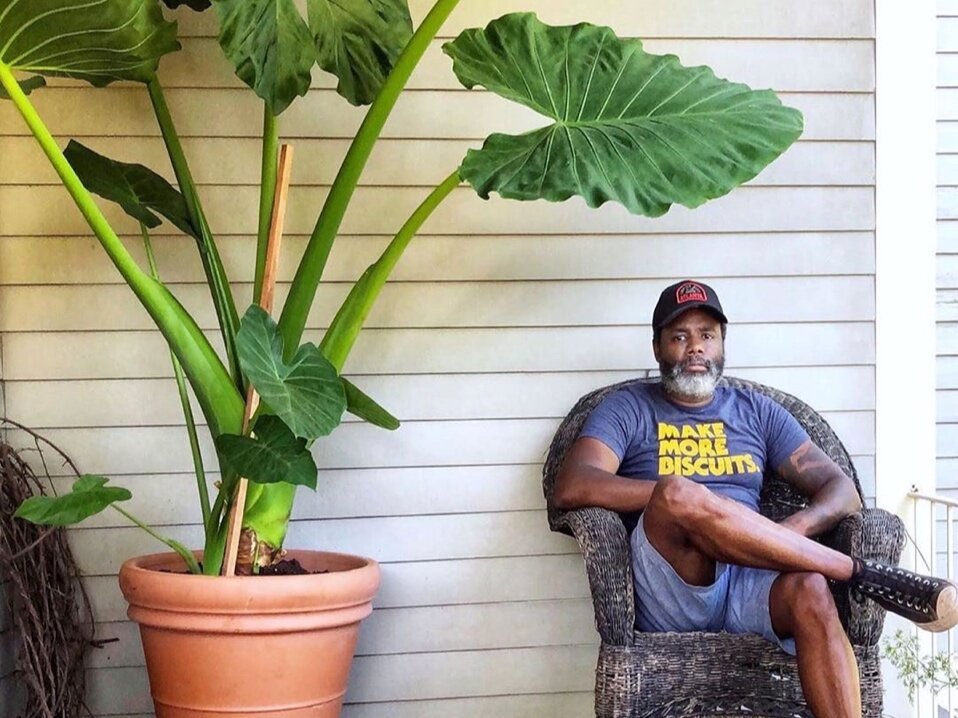Bobbie Gentry was a little-known 23-year-old singer-songwriter from Woodland, Mississippi, when her song “Ode to Billie Joe” rose to the top of the charts in 1967. When novelist Mesha Maren started singing along to Gentry’s lyrics as a child in the early ‘90s, she heard a story of the rural South that helped her to find her own voice as a writer.
Story by Mesha Maren
Illustration by Abbie Giuseppe
Before Larry Brown ever brought his gutsy, naive, and strikingly sensual heroine, Fay, to the page; before Robert Stone and Denis Johnson became famous for their down-and-out country queens, Geraldine and Jamie, there was a 23-year-old songwriter from Woodland, Mississippi, who was already writing about the dirt and dazzle of the working-class white female experience. Bobbie Gentry is her name and I recently came to realize just how much her writing has influenced my own.
As a young fiction writer, I became enthralled with Larry Brown’s novel Fay, and later with Robert Stone’s A Hall of Mirrors and Denis Johnson’s Angels. All three of these books revolve around characters who were like none I had previously experienced in literature: women from either the rural South or Appalachia who make their way through the world by relying on determination, gut instincts, and a knowledge of what their own physical beauty does to the men around them. These are women who are often overlooked in both literature and mainstream culture, written off as either shamelessly slutty or tragic and pitiful. But when I read those novels, at age 21, something leapt in my brain. These were the types of characters that I was scribbling about in my notebooks every evening, and these were the types of women I saw all around me in real life every day: the women I worked with at the strip club, at the diner, and on the office building janitorial team. We weren’t tragic, we weren’t pitiful, and we most certainly had stories to tell.
Later, in conversations with other writers, I would say that Brown’s Fay was the first time I ever experienced a representation of a woman like this. After listening to Tyler Mahan Coe’s podcast "Cocaine & Rhinestones," I learned that Bobbie Gentry was my true early muse.
Let’s rewind for a minute. It’s the summer of 1991. I’m 7 years old. My sister, who is four years older, has a pink battery-operated radio. We sit on the front porch of the house my father built in the mountains of southern West Virginia, listening to that radio for hours. This particular summer, twangy female vocals and a jumping guitar riff keep coming over the airwaves again and again. “Here’s your one chance, Fancy, don't let me down!” Reba McEntire belts out, and my sister and I sing along.
“I might have been born just plain white trash / But Fancy was my name!” I loved Reba with her red hair and spunky attitude, and the song danced through my imagination endlessly. The lyrics tell the tale of a young woman with a red velvet dress and a difficult life story who flat-out refuses to feel ashamed. She grows up in a shack outside New Orleans and when her father abandons the family, Fancy’s mom decides that Fancy needs to "move uptown" by finding powerful men who will make her rich in trade for access to her body. Fancy and her mother are very matter of fact about the situation and within 15 years, Fancy has a flat in New York, a mansion in Georgia, and zero regrets. The story is simple, beguiling and one-of-a-kind, and it stuck with me long after that summer (I even named a character in one of my first short stories Fancy — my Fancy is a pet goat but she is a very special goat.)
Around the same time, in the early ‘90s, I became infatuated with another song. My dad was always singing and playing the guitar. He played in the morning before work, while waiting for dinner, and, most importantly, every night before bed. One evening, when I was about 8 or 9, he played a tune I’d never heard before. It started with a simple guitar riff and then the words, “It was the third of June, another sleepy, dusty Delta day / I was out choppin’ cotton, and my brother was balin’ hay.” The lyrics went on to tell the story of Billie Joe MacAllister who “jumped off the Tallahatchie Bridge” and an unnamed female narrator who is deeply stricken by this suicide, yet largely ignored by her family who goes on about their day as if nothing has changed. When my dad finished, I insisted that he play it again. There was something darkly beautiful and enormously true in that song, something that rang inside me and never really left.
It would be years until I actually heard Gentry sing the song on the radio, and years more before I realized that it was also she who had penned “Fancy.” When I heard Coe talk about Gentry writing “Fancy,” it struck me like a bolt of lightning: the influences that most helped me to write my rural female characters did not begin with male fiction writers like Brown and Stone and Johnson, but rather with female country music singers and songwriters. Gentry, McEntire, Deana Carter’s performance of “Strawberry Wine,” and The Chicks' version of “Goodbye Earl.” These women taught me to write about desire and the realities of growing up in rural places, the beauty of Southern summers, and the claustrophobic nature of small-town life.
Fascinated by the unacknowledged influence Gentry had exerted on me, I began to research her and found, to my delight, that she first wrote “Ode to Billie Joe” and “Fancy” as short stories. In early handwritten drafts of “Ode to Billie Joe,” you can see her adapting the story and paring it down to a Raymond Carveresque simplicity. She changes it from third person to first. She cuts out the narrator’s name (Sally Jane Ellison) and zeros in on those quotidian details (Mama hollering “remember to wipe your feet” and Daddy passing around the cornbread and blackeyed peas) that so perfectly illustrate the numb silence that surrounds Billie Joe’s death.
As in any great literature, it is what the characters do not say that speaks most loudly. “The song is sort of a study in unconscious cruelty,” Gentry explained in a BBC interview conducted by Fred Bronson in 1968. “Anyone who hears the song can think what they want, but the real message of the song, if there must be a message, revolves around the nonchalant way the family talks about the suicide. They sit there eating their peas and apple pie and talking without even realizing that Billie Joe’s girlfriend is sitting at the table.”
Gentry herself was no stranger to nonchalant cruelty. After “Ode to Billie Joe” rose to the top of the charts in 1967, overtaking The Doors, Aretha Franklin, and The Beatles, Gentry was treated by the music industry as something of an exotic bauble. She’d grown up in Chickasaw County, Mississippi, in a house with no electricity. She was a smashing success and no one seemed capable of understanding this. “Twenty-three year old Bobbie Gentry is anything but the hillbilly folk singer you might expect,” one reviewer wrote. “If she didn't have a Miss America type figure (37-23-37) you might call her an intellectual.” Gentry produced her own songs as well as writing them and singing them, but she was not given producer credit and multiple men tried to claim they penned the lyrics to her most famous song.
The more I read about Gentry, the more of a kinship I began to feel, a kind of confirmation that she had always been my muse even when I did not know her name. Not only are her narratives about strong Southern women but there was also something undoubtedly queer about her performances, especially her Las Vegas shows. She had a whole gender-bendery bit where she dressed as Elvis Presley and most of her backup dancers were men in feminine clothing — bikini tops, glittery necklaces, and deer antler headdresses. And, while I know that the 1976 movie “Ode to Billy Joe” was not written by Gentry, I find it very interesting that the adaptation has Billy Joe admitting to a sexual affair with a man. It speaks to something that is present in the song’s atmosphere. Gentry’s lyrics do not say anything explicitly about the gay rural experience, but they do touch on unspoken and perhaps unrequited desire, themes that mark the lives of rural queers and themes that I work with in almost all of my own writing.
In 1983, one year before I was born, Gentry "disappeared." She stopped performing, stopped giving interviews, and stopped appearing in public. There have been many speculations as to where she is and what she is doing. Some claim to have seen her in a gated community outside Memphis, Tennessee, others in Los Angeles. I hope Gentry left the spotlight to focus more on her writing, something she always said she wanted to do. Perhaps in her suburban mansion, there lies waiting the best unpublished collection of short stories the American public has yet to see.
Mesha Maren is the author of the novel Sugar Run (Algonquin Books). Her short stories and essays can be read in Tin House, The Oxford American, The Guardian, Crazyhorse, Triquarterly, The Southern Review, Ecotone, Sou’wester, Hobart, Forty Stories: New Writing from Harper Perennial, and elsewhere. She was the recipient of the 2015 Thomas Wolfe Fiction Prize, a 2014 Elizabeth George Foundation grant, an Appalachian Writing Fellowship from Lincoln Memorial University, and fellowships from the MacDowell Colony and the Ucross Foundation. She was the 2018-2019 Kenan Visiting Writer at the University of North Carolina at Chapel Hill. She is an Assistant Professor of the Practice of Creative Writing at Duke University and also serves as a National Endowment of the Arts Writing Fellow at the federal prison camp in Alderson, West Virginia.
Abigail Giuseppe is an illustrator, portrait painter, and pattern designer based outside of Washington, D.C., who loves bright warm colors, pop culture, and exploring historic landmarks. When Abigail isn’t drawing and painting, she can be found in the back corners of antique malls looking for odd plates to add to her collection or ordering her third espresso shot of the day.







